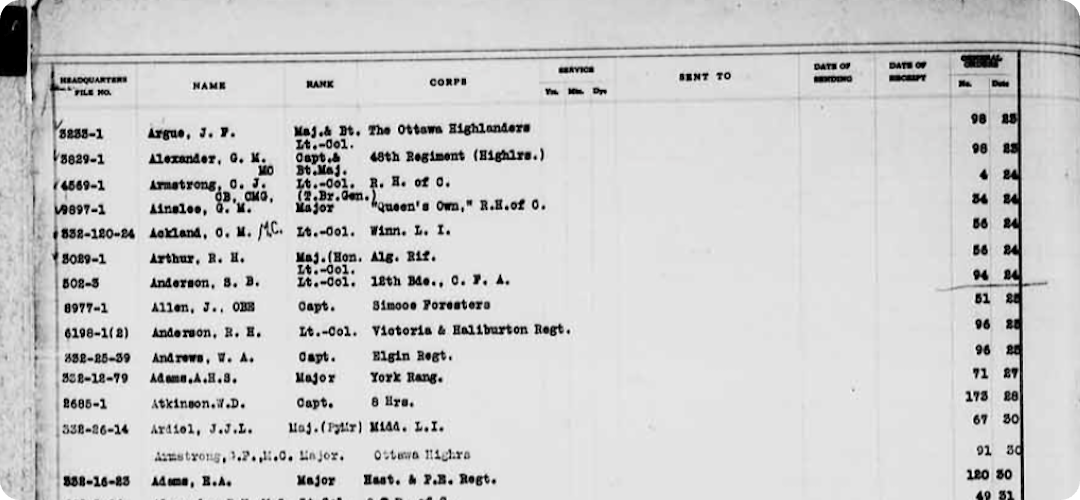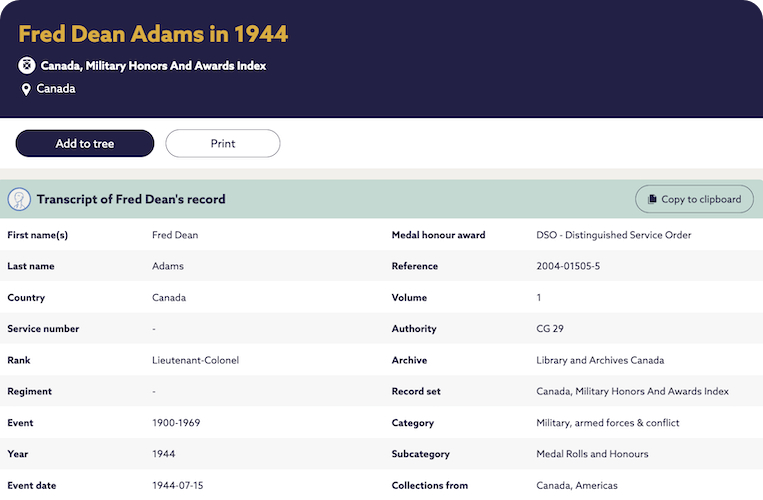Celebrating Canadian military stories this Findmypast Friday
6-7 minute read
By Daisy Goddard | December 1, 2023
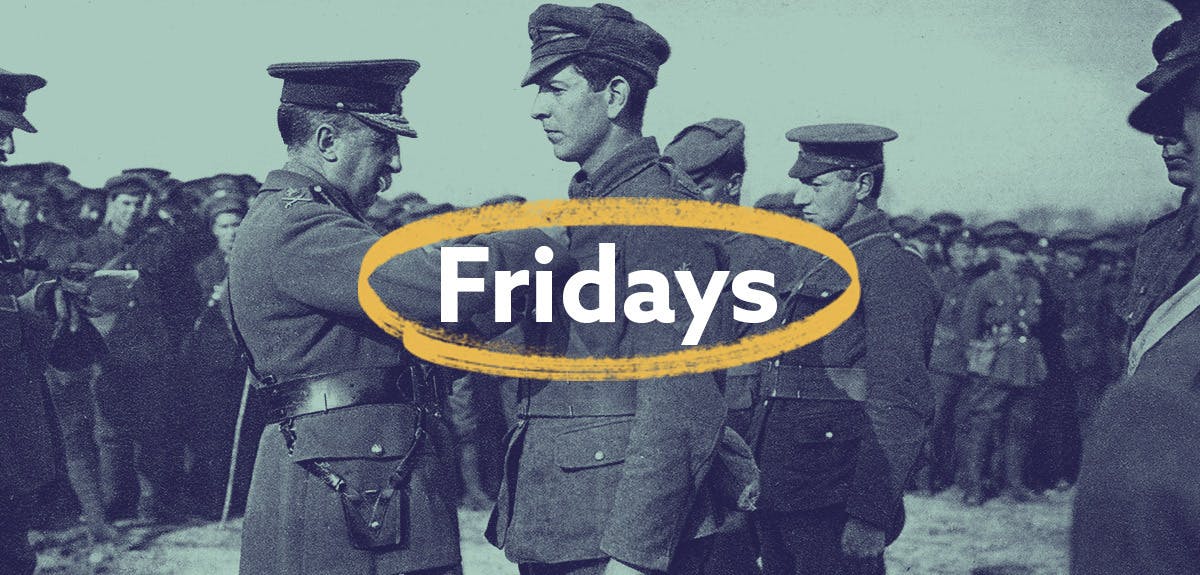
With over 120,000 new records and two brand new newspaper titles added, there is so much to explore.
We're in Canada this week, with two brand-new military collections containing around 120,000 new records. These sets mark the beginning of our partnership with Library and Archives Canada (LAC), which will allow us to bring even more fascinating Canadian records to Findmypast in the coming years.
We've also added two new titles from Scotland and England to our newspaper collection, and updated 16 of our existing publications. Read on for a full rundown of all that's been added this Findmypast Friday.
Canada, Military Honours and Awards Index
The first of this week's Canadian duo is the Military Honours and Awards Index. This new set from Library and Archives Canada contains 113,457 transcriptions taken from a variety of medal award collections. For some records (around 28,000 in total), you'll also find an original image.
Unique to Findmypast, these records contain the first and last name of each medal recipient, regiment, rank, medal type, and the date that it was awarded. If you've got Canadian roots, your military ancestor's name may just appear.
The records in this collection span over 150 years, from 1812 to 1969. During this time, Canada was involved in an array of military conflicts, including the War of 1812, the Anglo-Boer War (1899-1902), colonial expeditions in Sudan and South Africa, and the defeat of Native-descended Métis people in current-day Manitoba and Winnipeg.
This time frame of course also includes both the First and Second World Wars. An estimated 1.65 million Canadians fought in these two conflicts combined - many of whom were decorated for their bravery. Their stories are documented in this new record set.
Canada, Courts Martial of the First World War Index
The second of this week's Canadian additions is an index of court martial records from the First World War. This collection recounts members of the Canadian Expeditionary Forces who were accused of military and civilian offences.
All manner of offences - from disobeying orders to desertion and theft - can be found within these records. Punishments varied widely, from fines and imprisonment to execution in some cases.
In addition to a full name, service number, rank, regiment and unit, these records contain the date of the event and the offence. Many transcriptions also contain additional remarks which can shed further light on each case.
In the additional information on the record set page, you'll find a link to the original digitised records.
Organised by microfilm number, these images provide a great way to delve even deeper into each soldier's story. The sentence is even listed in cases of conviction, allowing you to determine the outcome of a Court Martial case.
The story of Private Claude Nunney
With some digging into this week's two new sets, we managed to uncover the fascinating story of Claude Nunney, whose name appears in both the military awards and Court Martial collections.
Claude was born Stephen Sargent Claude Nunney in Hastings, England on 19 July 1892. Aged 13, he was one of over 130,000 Home Children who were sent as immigrants from Britain to other countries in the Commonwealth between the 1860s and 1970s. Claude was in an orphanage prior to being sent to Canada by the Catholic Emigration Association in 1905.
In the First World War, Nunney served as a machine gunner with Canada's 38th Battalion (later known as the Cameron Highlanders of Ottowa). Our records reveal a surprising story, of Nunney's military heroism as well as his disobedience on at least one occasion.
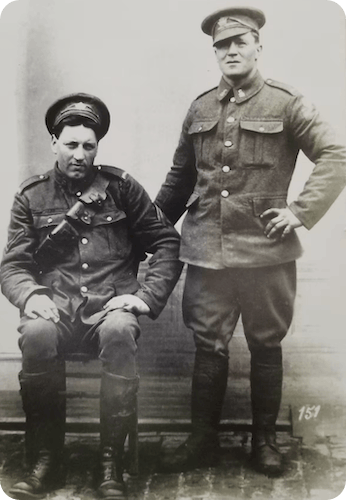
Claude Nunney, 1915. Photo credit: Peter Silk.
The 38th Battalion fought in France from August 1916. A year later, Nunney singlehandedly halted an attack by 200 men at the fight for Vimy Ridge He was awarded the Distinguished Conduct medal for his bravery, which is the Canadian Army's second-highest decoration, and was also promoted to Sergeant.
But Nunney's commendations didn't stop there. He earned the Military Medal just two months later, when he rescued an injured soldier from no man's land, putting his own life on the line to bring the man back to the trench.
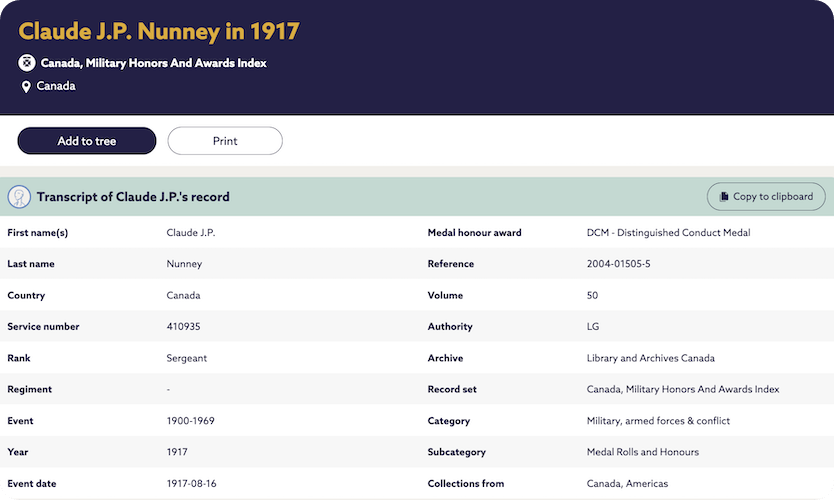
Claude Nunney's Distinguished Conduct Medal. View this record.
Despite his highly decorated status, Nunney wasn't always on the straight-and-narrow. As our Court Martials collection reveals, Nunney was found guilty of striking a superior in April 1918. He was sentenced to a year's imprisonment in England - his sentence would likely have been much harsher had he not been so highly commended.
While awaiting transportation across the English Channel, however, Nunney unexpectedly came across a shot-down German plane. In an attempt to recover important information from the pilot and observer inside the plane, Nunney tried to save two men from the burning wreck.
In response to this act of sacrifice, Nunney had his prison sentence commuted and was instead demoted back to Private. He would go on to fight one more major battle, at the Drocourt-Quéant Line, in September 1918.
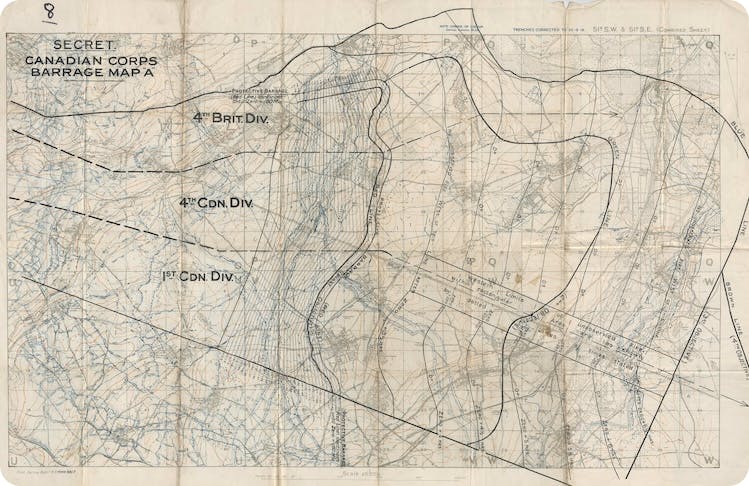
The Drocourt-Quéant Line, 1918.
Nunney died of his injuries on 23 September 1918. He was posthumously awarded the Victoria Cross - the military's highest honour.
As Claude Nunney's story indicates, there are many surprising finds hiding within our new Canadian collections. What will you be able to uncover?
New pages from Carrickfergus to Croydon
Our newspaper collection grew by a total of 218,837 pages this week. We added two brand-new titles, and updated 16 existing publications.
To mark St Andrew's Day, we've added a brand new Scottish title - Scotland on Sunday - with pages from 1988 to 2002 available. This newspaper was founded in Edinburgh in 1988, as the sister paper of The Scotsman.

Scotland on Sunday, 27 November 1994.
Its first issue was sold for the price of 40p, declaring itself to be 'the voice of reason, common sense and enterprise - with a Scottish accent'.
Within this broadsheet you'll find articles on everything from finance to farming. It provides a valuable insight into the local goings-on of Edinburgh in the 20th century. If you have Scottish roots, you may even find a familiar surname or two within these pages.
This week's second new title is the unusually named Kidderminster Shuttle. Founded in the Worcestershire market town of Kidderminster in 1870, this newspaper takes its name from Kidderminster's carpet weaving industry - a shuttle being a commonly used weaving apparatus.
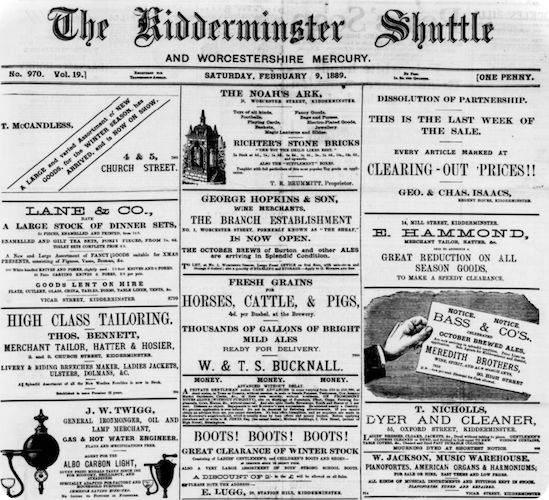
Kidderminster Shuttle, 9 February 1889.
This weekly title was sold every Saturday for the price of one penny.
In its eight pages, you'll find local, national and international news, as well as general interest articles on a wide range of topics. As its name suggests, much of the paper is also focused on the local carpet trade.
In addition to this new duo, we added pages to 16 existing newspapers in our collection. The Gloucestershire Echo grew by 46,000 pages, while the Northern Irish Portadown Times also received a significant update of 41,000 pages.
Here's a full rundown of all that's been added this week:
New titles:
- Kidderminster Shuttle,1889
- Scotland on Sunday, 1988-2002
Updated titles:
- Atherstone News and Herald, 1997-1998
- Carrick Times and East Antrim Times, 1994
- Coleshill Chronicle, 1991-1992, 1997-1998
- Crowthorne Times, 1987
- Croydon Post, 1997-1998
- Edinburgh Evening News, 1982
- Football Post (Nottingham), 1999
- Fulham Chronicle, 1990
- Gloucestershire Echo, 1986-1989
- Londonderry Sentinel, 1989, 1992-1994
- Lurgan Mail, 1990
- Peterborough Herald & Post, 1996
- Portadown Times, 1982-1997
- Protestant Vanguard, 1933-1934
- Skelmersdale Advertiser, 1987
- Western Evening Herald, 1999
Have you made a surprising family history discovery? Whatever you've uncovered about your past, we'd love to hear about it. You can now get in touch and tell us directly, using this handy form.
Last week, we added brand new burials for Kent and Herefordshire. If you've got ancestors from the Cumberland area, be sure to explore the full update here.
Related articles recommended for you
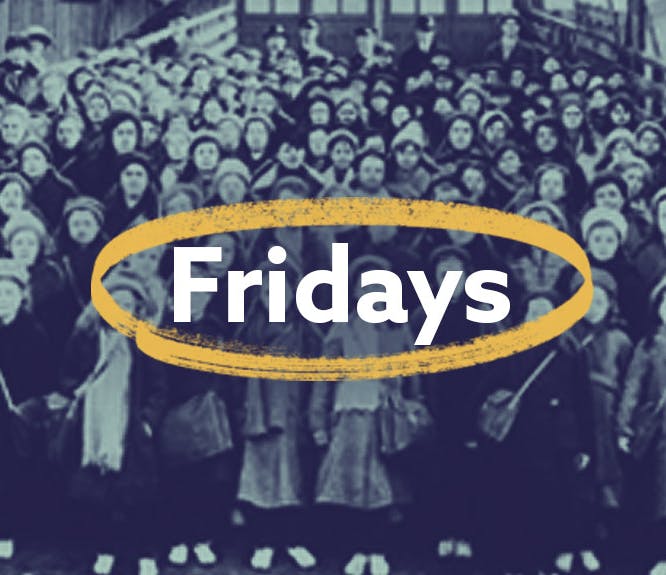
Commemorating British Home Child Day with over 2,000 new records
What's New?

Discover the history of the Royal Society of Arts
What's New?

Explore new English parish records
What's New?

